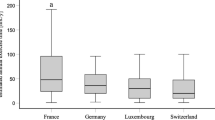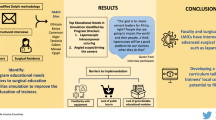Abstract
Objectives
The main objective of this study was to evaluate surgery training and evaluation of French gynecology-obstetrics residents. The second objective was to evaluate using simulation during residency.
Study design
This national descriptive study, utilized a questionnaire to survey all interns in French gynecology and obstetrics. At the end of a study, 129 responses of residents were analyzed.
Results
The participation rate was 12%. The majority of residents were women (84%) and the highest response rate was from the Ile-de-France region (36%). The lowest rate was from the Southern region. The majority of residents were in the eighth semester (20%). Residents reported surgical and obstetric orientations in 53% (n = 68) and 44% (n = 57) of cases, respectively. Registration for cancer oncology was reported by 22% (n = 28) of respondents. Evaluation of oncologic surgery training was mostly considered “good” by the surgical group and “passable” by the obstetrics group. Access to simulators was usually restricted and most often utilized the pelvitrainer. Sessions were typically not mandatory and numbered between zero and five per semester. Three types of simulators were accessible in the Ile-de-France, North-West, West and Rhône-Alpes. The North-East did not have access to animal models, and the South-West did not have access to corpses. Surgical classes were more common in the Rhône-Alpes, North-East, Ile-de-France and North-West regions. To improve their training in oncological surgery, 64% (n = 18) of residents planned to do an inter-university exchange and 54% had completed additional specialized training. Measures that were most expected to improve training were increased training in surgery (96% of respondents, n = 27) and more intensive coaching (96%, n = 27).
Conclusions
Companionship is a pillar of residents training, but its effectiveness is variable. One solution could be to implement better use of simulation methods.
Similar content being viewed by others
References
Granry JC, Moll MC (2012) Rapport de mission : état de l’art (national et international) en matièrre de pratiques de simulation dans le domaine de la santé. Haute Autorité de santé. [Internet]. Disponible sur: Rapport accessible sur http://www.has-sante.fr/portail/upload/docs/application/pdf/2012-01/simulation_en_sante_-_rapport.pdf
Crochet P, Aggarwal R, Berdah S, Yaribakht S, Boubli L, Gamerre M et al (2014) Utilisation des simulateurs pour former les internes de chirurgie gynécologique en France : un état des lieux en 2013. J Gynécologie Obstétrique Biol Reprod 43(5):379–386
Botchorishvili R, Rabischong B, Larraín D, Khoo CK, Gaia G, Jardon K et al (2012) Educational value of an intensive and structured interval practice laparoscopic training course for residents in obstetrics and gynecology: a four-year prospective, multi-institutional recruitment study. J Surg Educ 69(2):173–179
Philippe A-C, Botchorishvili R, Pereira B, Canis M, Bourdel N, Mage G et al (2013) Intérêt d’un enseignement structuré de la cœlioscopie en centre de simulation: enquête d’opinion auprès des internes. J Gynécologie Obstétrique Biol Reprod 42(3):238–245
Rathat G, Hoa D, Gagnayre R, Hoffet M, Mares P (2008) Formation chirurgicale des internes, spécialistes en gynécologie-obstétrique : résultats d’une enquête électronique nationale. J Gynécologie Obstétrique Biol Reprod 37(7):672–684
Tranchart H, Aurégan JC, Gaillard M, Giocanti-Aurégan A (2015) Évaluation des compétences techniques des internes de chirurgie ophtalmologique, orthopédique et digestive français: état actuel et perspectives. J Fr Ophtalmol 38(8):679–688
Postes et rangs en gynécologie-obstétrique [Internet]. Disponible sur. https://www.remede.org/internat/cartes-enc/index.html. Accessed 26 May 2019
Fournié A, Descamps P (2006) La formation des internes de gynécologie obstétrique À propos d’une expérience de visites sur sites. J Gynécol Obstét Biol Reprod 35:538
Appleton S, Huguelet P (2016) Laparoscopy skills simulation for the obstetrics and gynecology resident. MedEdPORTAL Publ [cité 26 mai 2019];12. Disponible sur. https://www.mededportal.org/publication/10460. Accessed 26 May 2019
Jordan A, El Haloui O, Breaud J, Chevalier D, Antomarchi J, Bongain A et al (2015) Formation des internes de gynécologie obstétrique: évaluation d’un programme pédagogique intégrant cours théoriques et sessions pratiques sur simulateurs. Gynécol Obstét Fertil 43(7–8):560–567
Danion J, Delpech P-O, Breque C, Oriot D, Richer J-P, Faure J-P (2017) Simlife: un nouveau dispositif de simulation à très haut degré de réalisme en médecine interventionnelle. Morphologie 101(335):182–183
Fazel A, Fauvet R, Bats A-S (2019) Evaluation de la formation chirurgicale pratique des internes DES de Gynécologie-Obstétrique. Disponible sur: https://www.edu.upmc.fr/medecine/pedagogie/memoire/Memoires%202011/2011%20PDF/Bats-Fauvet-Fazel.pdf. Accessed 26 May 2019
Acosta D, Castillo-Angeles M, Garces-Descovich A, Watkins AA, Gupta A, Critchlow JF et al (2018) Surgical practical skills learning curriculum: implementation and interns’ confidence perceptions. J Surg Educ 75(2):263–270
Shore EM, Lefebvre GG, Grantcharov TP (2015) Gynecology resident laparoscopy training: present and future. Am J Obstet Gynecol 212(3):298–301.e1
Author information
Authors and Affiliations
Corresponding author
Ethics declarations
Conflict of interest
The authors declare that they have no confict of interest.
Additional information
Publisher's Note
Springer Nature remains neutral with regard to jurisdictional claims in published maps and institutional affiliations.
The study was conducted across all regions of France.
Appendix: Questionnaire
Appendix: Questionnaire
Question 1: You are:
-
Male
-
Female
Question 2: What is your current semester?
Question 3: What is your inter-region?
-
Ile-de-France
-
North-West
-
North-East
-
West
-
South
-
South-West
-
Rhône-Alpes
-
Antilles-Guyane
Question 4: What is your orientation?
-
Obstetric
-
Surgical
Question 5: Are you registered for oncology DESC?
-
Yes
-
No
Question 6: If not, do you plan to register in the future?
-
Yes
-
No
Question 7: Overall, how would you rate your training in oncological surgery?
-
Excellent
-
Very good
-
Good
-
Fair
-
Bad
Question 8: Regarding surgery of gynecological cancers, how would you rate your training ?
-
Excellent
-
Very good
-
Good
-
Fair
-
Bad
Question 9: Do you have access to simulators as part of your training in oncology surgery?
-
Yes
-
No
Question 10: If so, are simulation sessions mandatory?
-
Yes
-
No
Question 11: How many sessions do you attend per semester?
-
Between 0 and 5
-
Between 5 and 10
-
Between 10 and 15
-
Between 15 and 20
-
More than 20
Question 12: What kind of simulators do you have access?
-
Pelvitrainer
-
Animal models
-
Cadavers
Question 13: If you have access to a simulator, do you have free access (not restricted by specific slots)?
-
Yes
-
No
Question 14: Do you have courses in surgical anatomy during your residency?
-
Yes
-
No
Question 15: Do you have surgery courses during your residency?
-
Yes
-
No
Question 16: If so, during which course?
-
DES courses
-
Bibliography
-
IUD courses
Question 17: Do you have mandatory surgery diplomas for the validation of your DES?
-
Yes
-
No
Question 18: During your residency, do you have mandatory theoretical courses in oncological surgery?
-
Yes
-
No
Question 19: During your residency, do you have mandatory practical courses in oncological surgery?
-
Yes
-
No
Question 20: Do you have training using video surgery during your residency?
-
Yes
-
No
Question 21: If so, is this training mandatory?
-
Yes
-
No
Question 22: Do you do a semester in a regional cancer center during your residency?
-
Yes
-
No
Question 23: Is a semester in a regional cancer center (RCC) during your residency:
-
Mandatory
-
Mandatory if you have access
-
Optional
-
Doing an inter CHU?
Question 24: If you are not doing a semester in an RCC during your residency, what is the reason?
-
There is no RCC in your region
-
You did not have access
-
You did not wish to have access
Question 25: During your residency, do you benefit from training on the information given to patients of oncological surgery?
-
Yes
-
No
Question 26: During your residency, do you benefit from training in the writing of an operative report?
-
Yes
-
No
Question 27: Do you think that having training on patient information and the writing of an operative report is important?
-
Yes
-
No
Question 28: Do you receive training for postoperative follow-up for patients who have experienced an oncological pathology?
-
Yes
-
No
Question 29: Do you think that training for postoperative follow-up is important?
-
Yes
-
No
Question 30: During your residency, is your theoretical knowledge in oncological surgery evaluated?
-
Yes
-
No
Question 31: During your residency, is your practical knowledge of oncological surgery evaluated?
-
Yes
-
No
Question 32: Are you considering or have you already completed an Inter CHU or a semester abroad to improve your practice?
-
Yes
-
No
Question 33: Would you find it helpful to have more training in oncology surgery during your residency?
-
Yes
-
No
Question 34: Do you follow or have you been trained specifically for oncology surgery?
-
DESC
-
Inter-university degree
-
Specialised training center (CICE)
Question 35: Do you think that companionship in the operating room should be more intensively performed for training in oncological surgery?
-
Yes
-
No
Question 36: Which measures do you think would be useful to improve your training in oncological surgery?
-
More access to theoretical training
-
More access to surgery simulators
-
More access to the operating room
-
Undertaking an intensive semester in a specialized service
-
Supervision by a senior who follows you in your curriculum to train you and guide you in your choices
-
Seniorization during your residency (work as the main surgeon without the help of a senior)
Rights and permissions
About this article
Cite this article
Gac, M.M., Duminil, L., Bonneau, S. et al. Gynecology-obstetric resident surgery training: a national evaluation. Arch Gynecol Obstet 300, 1353–1366 (2019). https://doi.org/10.1007/s00404-019-05284-9
Received:
Accepted:
Published:
Issue Date:
DOI: https://doi.org/10.1007/s00404-019-05284-9




